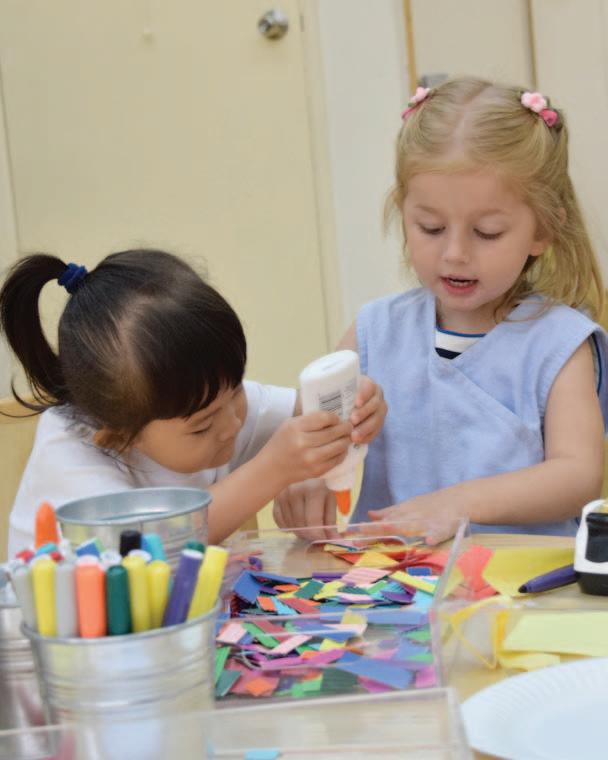
5 minute read
International education in early childhood – what does it look like? Nicola Weir
International education in early childhood – what does it look like?
Nicola Weir on the importance of the early years
Much of the research and literature on ‘international education’ or ‘international mindedness’ indicates the importance and value for learners of displaying a mindset and disposition of ‘global mindedness’, if they are to be successful and positive contributors to a world that is increasingly a global village (Haywood, 2007). For our children, the expectations from parents, school and society as a whole are high; parents want their child to be skilled and intellectual, while possessing qualities such as cultural understanding, good communication, people skills, multiple languages, and so much more.
At Yew Chung International School (YCIS) Kindergarten in Hong Kong, we constantly reflect and ponder on what ‘international education’ means for an early childhood setting. We ask ourselves: can young children experience education that enables them to develop understanding and a disposition of ‘international mindedness’? We discuss and question: how does a child who is still developing the very basics of ‘cultural identity’ also develop ‘intercultural understanding’? Is it possible for a young child not only to develop a personal identity of who they are as an individual, but also to develop the ability to connect with another individual who possesses different language, looks, and mannerisms?
Working in an early childhood setting, looking at ‘international education’ and linking it to well-known theories of early childhood education, we explored the theories of Erikson (1980) and Vygotsky (Daniels et al, 2007) whose research suggests that young children learn from both the physical world and the social world around them. They explain that children are ‘imitators’, learning and mimicking the behaviours, thinking processes, and experience-related

responses they have observed from others. Children’s development of culture, and the understanding of how to ‘belong and behave’ within a social setting, develop through interactions with their physical and social environment. The messages those around them send, their experiences, and the meaning-making from those relationships, build within the child his/her ‘cultural identity’. Erikson argues that the quality of a child’s cultural and personal identity depends on the quality of the connection between the child and his/her primary care-giver, as well as the quality of relationships in the first few years of their life between the young child and those significant adults. He explains that children need to experience a healthy emotional connection with their caregiver(s) in order to develop trust; trust that will be needed in order for children to make effective and optimal connections with the world around them, both intellectually and socially. Relating recent neuroscience discoveries to Vygotsky’s and Erikson’s theories on child development, it is evident that children learn best from real-life experiences and interactions with others. Findings from latest studies suggest that the brain in a young child has more active synapses than at any other time in its development. Studies show how supple a young child’s brain is, and that every experience and interaction with another person – especially a person of significance to the child – affects a child’s brain development and intellect, negatively or positively. The more repetitive the experience, the stronger the connection and synapse– this eventually develops instinct within the child. Neurological research has also discovered the pruning process of the brain, where any synapse not being utilized, dies. To truly benefit from the opportunity to develop an instinctual ability of cultural awareness and sensitivity, Erikson says a child needs to establish trust: trust in those around them, and trust in their environment. Without this established trust, a child will feel anxious and fearful, resulting in compromised growth and development of intellectual and social learning, keeping the child from adopting a healthy understanding of the ‘bigger world’. A young child’s first experiences of interactions with significant others both at home and school thus play a vital role in his/her forming of ‘international mindedness’.
Early childhood is the first experience for a child in expanding their ‘world’ from a small context (home) to a larger social context (school). The implication of this is that a child between the ages of birth and two, who has been predominantly with family – forming those close emotional bonds and adopting the behaviours and mannerisms they have been experiencing and observing at home – upon entering the school environment is now exposed to a new world of ‘culture’, where different people are not acting and sharing the same mannerisms and behaviours as home. Understanding this new era of a child’s development brings with it the responsibility of catering for the child’s first home culture, while establishing a wider school culture.
At YCIS Hong Kong, co-teaching is practised within the early childhood setting, whereby one teacher from Hong Kong whose first language is Cantonese, and a second teacher from another country whose first language is English, work collaboratively in establishing one programme for the learners. These two teachers come together with their unique ‘east’ and ‘west’ perspectives, and passionately work towards building quality relationships with the children, each teacher sharing with the children his or her first language, culture, different looks, and unique perspectives; providing children with first hand experiences of building deep and meaningful connections with two significant adults who are different from each other. Children within the programme, also varying in culture and ethnicity, come together in friendships as classmates, and share with each other their uniqueness while also learning and becoming subconsciously aware of differences and diversity amongst the members of the classroom and school. Our hopes are that this opportunity provided to young children for building trusting, quality and interactive relationships, where they are free to explore their own unique perspectives, behaviours and intellectual interests while experiencing diversity with others, will ensure that the children will begin their journey of ‘international education’ in a positive way.
References
Daniels H, Cole M and Wertsch J (2007) The Cambridge Companion to Vygotsky, Cambridge: Cambridge University Press Erikson E (1980) Identity and the Life Cycle, London: W Norton Haywood, T (2007) A Simple Typology of International-Mindedness and Its Implications for Education, in M Hayden, J Levy and J Thompson (eds), The Sage Handbook of Research in International Education [pp 79-89] London: Sage Publications










